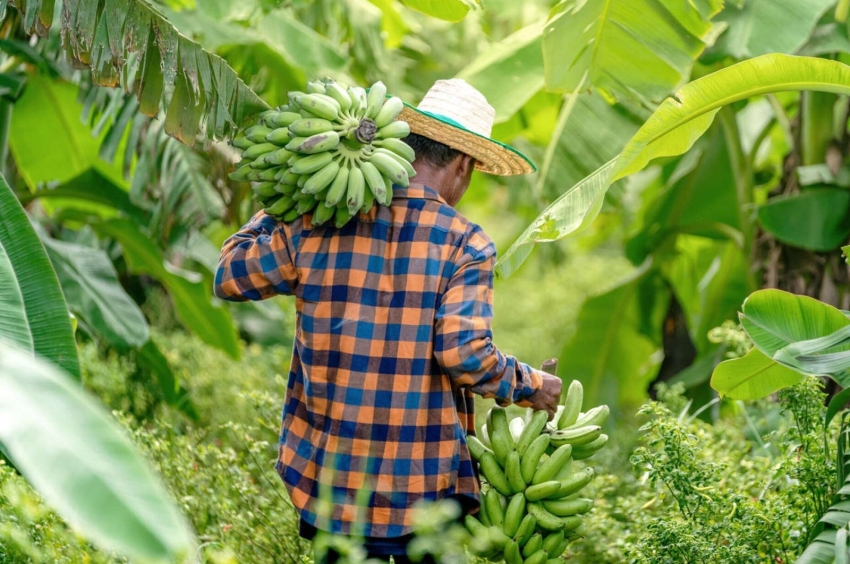The first official mention of an insurance scheme for banana cultivators is nestled in a government strategy report dated 1999. Then, a two-year-old Kenny Anthony Administration inherited a sector under siege by the shifting sands of global trade policy and societal deficiencies despite decades of economic output.
It is at this juncture that we once more reexamine, albeit briefly, our banana revolution, “green gold” and its shortcomings, especially where wider societal revolution is concerned.
Figures show that the sector would attract as much as USD$70 million yearly for local farmers. Despite these figures, by the time the sector became less profitable, societal conditions left much to be desired.
Entering the 21st Century, Saint Lucia had failed to achieve universal secondary education, sexual and reproductive health services were still lacklustre or unavailable, and much of the nation’s youth remained largely unskilled and undereducated. To combat this, Saint Lucia benefited from EC $40 million in European funding to fill these social gaps as its main revenue-generating export crop faced increased global competition.
Indeed, we recognise that the gains generated from the once bustling banana sector were not further reinvested in the improvement of the quality of social services, education, or healthcare of the Saint Lucian people. A “too big to fail” posture was assumed by government authorities and key players within the sector that blinded them to the many obvious vulnerabilities and risks that would bring “green gold” down to size.
For instance, that Saint Lucia is prone to adverse weather systems from June to November yearly did not impress upon the powers-that-were to ensure farmers’ crops – and livelihoods – were insured against foreseeable risks. Many farmers practiced monoculture, where only one crop (bananas) was cultivated, as opposed to diversifying their fields with fruit crops (that Saint Lucia, notably, exports today!), like breadfruit. Additionally, many farmers were not financially literate and thus did not have pension plans in place or other investments to cushion any economic blow brought about by changes in the global market.
Indeed, the historical significance of informal economic sectors cannot be understated. However, it is arguably incumbent on every government to ensure that informal sectors are formalised, of course, while preserving their inherent spirits.
It is sad, therefore, that in the government’s 1999 strategy report, it is admitted that, “Although actual data are not available, it is widely believed that the industry employs about 30,000 persons directly and indirectly.”.
How can it be that crucial data from the largest economic sector in the country was not appropriately recorded, so that policymakers would know (for a fact) how many pockets depended on bananas? – workers’ skills, farmers’ business data, et cetera.
Compounding the situation is the convergence of vulnerabilities that existed within the sector. Minister for Health and Human Services at the time, Sarah Flood-Beaubrun, in an address to the United Nations, noted that most cultivators themselves did not own the lands their farms were on, and most of these cultivators were women, often single mothers.
The lessons learned from Saint Lucia’s banana revolution are therefore numerous and include the necessity for education, skills development, and the adoption of best-practice cultivation techniques.
More relevantly, the establishment of an insurance scheme for farmers signals a more deliberate attempt to legitimise the sector. The public hears all too frequently the cries of the banana farmer when her harvest has been flattened by strong winds; or when, for one reason or another, black sigatoka ravages through the island; or when the arrival of package boxes is delayed. No matter the challenge, the result is the same: revenue lost, government intervention, repeat.
Therefore, this scheme is positioned to transition the sector from one of planting-harvesting-selling to one where the risks of business enterprise are front and centre.
The Caribbean Policy Development Centre back in 2008 lamented of the sector that, “... seasonality of both crop production in agriculture and tourism’s requirements intensifies the case for information systems that correlate visitor arrivals (demand) with harvest schedules (supply), given the lack of storage and processing facilities, tenure and land-use patterns, and a general absence of a business approach to agricultural production and marketing among small farmers.”
For far too long, the breadwinners of our economy have operated less like businessmen and women and more sporadically and laissez-faire. The blame, however, cannot be cast upon them.
I reiterate that it is for our governments to create (and see the realisation of) policy that will usher our society more and more into the 21st Century. We have no cause to boast that market vendors, who have laboured tirelessly for almost sixty years, are not covered with pension plans; the same obtains for many of our bus drivers, and hospitality (hotel) workers.
We must part ways with the notion that the government should only secure trade deals for farmers, or provide an enabling environment for foreign investment to boost sectors like tourism. In a country such as ours, where our people have historically and systemically been dislocated from the levers of power, autonomy or formalisation, it becomes the job of the government to ensure that farming is not an “old person’s job”.
We cannot allow the belief that agriculture, artistry, or entrepreneurship are for the uneducated or undereducated to continue being promulgated in the minds of our youth. It would be remiss of me not to acknowledge that, of late, our youth have been given opportunities to pursue aquaponics and hydroponics – modern agricultural practices, supported and funded by government; or that this country is at the frontier of an educational revolution with the introduction of technical and vocational institutes.
However, these policies should not whither on the vine and be regarded only as “Labour Party policies”, such that any other government believes that the responsibility is not theirs to continue these advancements.
It has to be understood by all that a government must protect its people, especially those on the frontline of decades-long economic participation marked by disproportionate vulnerability.
Indeed, people must always be the centre of policy.
References:
Caribbean Policy Development Centre (2008). ‘Fostering Better Linkages Between Agriculture and Tourism in St Lucia’, Caribbean Policy Development Centre, Bridgetown, Barbados, http://www.cpdcngo.org/IMG/pdf/Microsoft_Word_-_St._Lucia_Market_Access_Research_-_pdf.pdf
ECLAC (2005). ‘Agricultural Transformation and Gender Considerations in Caribbean Economies’, Economic Commission of Latin America and the Caribbean (ECLAC), LC/CAR/R.85, December, http://www.eclac.cl/publicaciones/xml/1/26011/R.85.pdf
Flood-Beaubrun, S (2000). Statement by the Minister of Health, Human Services, Family Affairs and Gender Relations, St Lucia to the 23rd Special Session of the UN General Assembly, June 2000, see http://www.un.org/womenwatch/daw/followup/beijing+5stat/statments/saintlucia7.htm


